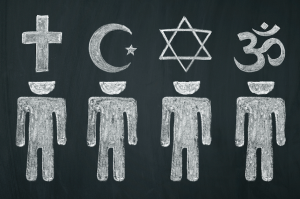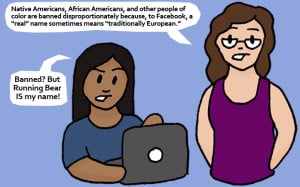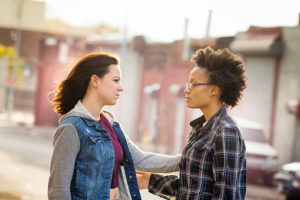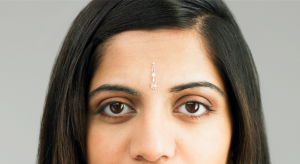
A person with glasses sitting up in bed, reading a book with a serious expression.
Throughout my life, I can’t recall ever knowingly encountering someone with a learning disability until I got to college. I didn’t even realize I had one until a few years ago.
Of course, this is one of the challenges of living with an invisible disability – there aren’t necessarily outward signs of it. There are no mobility aids, no physical signs, and no telling markers or mannerisms known to the general public. Unless you know what to look for, you just don’t know. Being a professional (who have biases of their own) isn’t even a guarantee.
This means that living with an invisible disability has its own unique challenges, as we navigate both our everyday lives and the maze of the daily “little” oppressions (called microaggressions) and larger systemic oppression.
There are many types of invisible disabilities: chronic pain due to injury or other causes; mental disabilities like phobias, PTSD, and depression; HIV/AIDS; epilepsy; and diabetes. They run the gamut – and they affect our lives in vastly different ways.
I happen to have a few invisible disabilities, one of which is a learning disability. It doesn’t have a name, as I’ve never been formally diagnosed. It is most likely a version of dyslexia, which is one of the better-known learning disabilities. Like most disabilities, though, it’s not well understood by most people.
According to the Learning Disabilities Association of America, dyslexia is a “specific learning disability that affects reading and related language-based processing skills.” How dyslexic people experience it can vary widely: Some people have trouble decoding (understanding the pronunciation and meaning of words and sentences), some have trouble spelling, and some have trouble with their reading speed.
Some, like me, have issues with reading comprehension, which can encompass a host of problems within itself. I can read fast, but whether reading slowly or quickly, I can have issues understanding – comprehending – what I’ve read.
Reading is a big part of our lives. Whether you’re reading a recipe, directions to a new doctor’s office, articles about the latest political news, an e-mail from your boss, or a good book, reading is everywhere. And that means that my disability quite literally has a direct effect on how I go about my day and how well I function in life.
Unfortunately, many people don’t understand how deeply a learning disability can affect a person’s life. This can lead to things like those microaggressions I was talking about, which simply compound our struggles.
Intersectional feminism recognizes that we don’t live “single issue lives,” as Black lesbian feminist icon Audre Lorde once said. My experiences with disability are intertwined with my experiences as a Black person, as a woman, as a bisexual person, as a fat person, and as a poor person – and is bound with the privileges I have as well.
Feminism can’t reach its goals without advocating for and lifting up the most marginalized voices. In the words of poet Emma Lazarus, “Until we are all free, we are none of us free.”
So here’s a glimpse into my own life.
While I’m only one person, and dyslexia is only one kind of learning disability of several, hopefully it will give you a better understanding of some of the basic things we have to deal with on a regular basis.
And for those like me, I hope it gives you a boost of confidence and a sense of visibility. Our experiences and our feelings about them are just as valid as any other disability.
1. School Is a Challenge
It wasn’t always a challenge though. In fact, even after it started to manifest, I still graduated from high school third in my class. I always did well in school. I loved to read as a kid, and I was very good at it. In fact, it’s the reason why I’m a writer today.
Of course, “learning disability” gets its name because it’s most associated with schooling and development. Whether you’re homeschooled or attend private or public school, at some point, you begin to learn how to do things: sit up on your own, walk, talk, recognize faces, feed yourself, recall words, colors, and shapes.
For many kids, signs of a learning disability start pretty early. Whether or not one has the resources to address it, it often begins to manifest in elementary school or even pre-school. However, that wasn’t my experience.
For me, it started somewhere around middle school. At that age, books in school start getting significantly bigger and longer; assigned reading becomes more of a regular thing. Because I have difficulty with processing and comprehending text, longer text is often a challenge, as I recently wrote for Brooklyn Magazine.
I have trouble getting through texts and assigned chapters, which can make learning the necessary information to succeed in classes difficult. This is particularly an issue on the collegiate level, where new terms, theories, and concepts can make trying to comprehend what I’m reading that much more of a challenge.
And of course, this is all compounded by my other disabilities.
I often wouldn’t finish assigned texts. Sometimes I’d skip them altogether. I didn’t realize it at the time, but I tried to cope by finding shortcuts to learn what I needed to know. Thankfully, I was always a good test taker.
It wasn’t that I didn’t like school or that I didn’t want to learn, but I had a hard time keeping up. Combine that with the fact that I didn’t even understand what was going on with me until the very end of my schooling experiences, and the result is that I didn’t have access to the tools I needed to do as well as I could have.
I failed quite a few classes as an undergraduate student and failed a class my very first semester as a graduate student.
And, of course, school access and academia are intimately tied to classism, racism, ableism, and capitalism, which makes it an inherently unjust institution.
Just a brief history of schooling in the US reveals the historic and current ways that education has helped to perpetuate oppressive structures.
From deliberate withholding of education from marginalized groups to inadequate facilities and tools and abuse, the education system is just as seeped in oppression as the criminal justice system.
I’m finished with school now; though I still have a semester of graduate school left, I don’t plan to return as I’m focused more on my writing and filmmaking. But I’ll never forget those experiences, how they made me feel, and the wish that I’d been seen and helped sooner so that, as a college student, I could have excelled the way I know is possible for me.
2. Being a Writer Can Be Overwhelming
Well, this is the irony of ironies. I’m a freelance writer and an aspiring screenwriter with a learning disability that affects my ability to read. Who said God doesn’t have a sense of humor? (If you believe in that sort of thing.)
But in all seriousness, my learning disability can make both of these things difficult. While “learning disability” automatically conjures up thoughts of academia, it affects every aspect of our lives.
I’ve written before about how a lot of the advice given to writers can be super ableist. One of the most common pieces of advice for writers is to read a lot. A lot.
Ha.
Though I tend to stick to shorter texts like blogs and articles, even those can get taxing after a while. All of those shorter texts add up.
And because reading and writing are so intricately intertwined, it means that getting work done – whether I’m working on a draft for an editor or trying to work on a new screenplay or film notes – can be mentally exhausting.
I can take hours working on just one personal essay or article draft. I have to take a lot of breaks – sometimes every few minutes – so that my brain doesn’t get overloaded with information that it can’t process. I can ignore something for weeks, which can mean coming way too close to – or completely missing – deadlines.
If research is involved, that’s even worse, because then I have to find it and read everything. Just the thought of it as I type this makes my head hurt. And while I’m sure this is the case for some writers without learning disabilities, it’s an experience that’s amplified for people like me.
It can even create issues in more traditional lines of work. Reading, responding to, and writing e-mails can become exhausting when you’re an administrative assistant. Editing drafts of writing for newsletters and the like can be mind-numbing. There are just so. many. words. All day. I have such a love/hate relationship with them.
This isn’t to say that I can’t do the work; to believe otherwise is inherently ableist. Like many people with disabilities, I’m fully capable of being an excellent and reliable employee, as I’ve proven time and time again. I have the ability to hone my talents and skills into interesting, moving, and entertaining things that are worth reading.
But it does mean that how I work has to be a bit different. In addition, those who hire me – for a one-time gig or permanently – have to be understanding of my differences and be willing to work with me so that I can lead an independent life.
These are called accommodations, and it’s actually a part of US law, specifically the Americans with Disabilities Act, which was only signed into law in 1990.
Of course, we all know that that doesn’t mean that some people don’t still have their biases and act accordingly. Even with legal protections, ableism is rampant in hiring practices and, even when disabled people do get hired, we must still deal with lower pay, fewer promotions, and being relegated to the margins of industry.
Because of that, many disabled people with invisible disabilities don’t reveal that they are disabled, because of fear of not being hired or being treated differently because of it, which can create problems of its own when accommodations are needed.
I, myself, have been unemployed for three years – and while I’m sure there other factors that contribute to this (practical things, as well as my other marginalized identities), I think it speaks volumes about the kind of society we live in.
In any case, working with people who understand, or at least empathize with, the struggle makes working a lot easier.
3. My Self-Confidence Suffers
From a very early age, it becomes clear to children that one of the best things you can be is “smart.” You get praise and accolades from adults – and who doesn’t wanna impress the grown ups?
You can often find people sharing “amazing” videos about children reading, doing math or science, or playing instruments and composing music at incredibly young ages. How smart they must be, how intelligent! Whiz kid! Prodigy!
I was never a prodigy or a child genius, but for a long time, I was that “smart” kid. I always got good grades. The adults in my family, for whom education was of utmost importance, often asked me about school.
I still get asked about school (specifically, when will I finally finish grad school), but I’m not really the “smart” kid anymore. Not like I once was at least.
When you live in a society in which being “smart” is seen as something to attain and being smart only looks a certain way, if you don’t meet that criteria, well, you can begin to feel less than.
If you struggle to read, aren’t that great of a speller, or struggle with math due to a disability (or simply because you’re a bit slow to develop), being explicitly or implicitly told that you aren’t smart doesn’t feel that great.
And in a society determined to break down marginalized people physically, mentally, and economically, the importance of self-confidence and a positive self-image can never be understated.
People who aren’t men, people of color, disabled people, fat people, and many other marginalized groups are made to feel inferior by an oppressive society. It’s an insidious aspect of oppression, but it’s effective, which is why it continues to be perpetuated. Attempts to reject the idea that you’re less than are, in themselves, acts of resistance.
When I have to ask people on social media to restate or explain what they mean by something because I don’t understand what I read, I can get embarrassed. This is particularly hard since I’m a writer by trade, and I occasionally find that people look up to me. I don’t really feel worthy.
Because of this, I have a particularly strained relationship with ableist language like dumb, stupid, and idiot. These are all terms meant to signify how “smart” someone is and they all come from language originally meant to describe people with various developmental, intellectual, and learning disabilities.
They’re all slurs that are still used in that way.
Interacting with people online can aggravate these experiences, where it’s common for even the most well-meaning, “radical” people to ridicule others for misspelling words, grammatical mistakes, or having difficulties with following a conversation or understanding what’s happening. No one ever takes the time to think that perhaps the person with whom they’re interacting has a disability that affects all of those things.
And these microaggressions add up. They’re stressors that can affect our physical and mental health and, long-term, that stuff takes a toll on us.
Confidence in our bodies, our abilities, and our talents is important for healthy self-esteem and self-acceptance – and disabled people deserve those things, too.
***
Over the years, I’ve learned ways to cope with my learning needs in various ways. I try, as best as I can, to give myself extra time to accomplish tasks. I try to filter out negative self-talk. And I give myself a break every once in awhile. It’s okay to not always be “on.”
I still love to read (and, of course, write), and I try each day to live in a way that makes sense for me.
I hope that sharing my experiences has helped some feel less alone. And I hope it has helped others to not only have a better understanding of what it’s like to be different, but to pledge to commit to recognizing, respecting, and celebrating our differences as we all march toward collective liberation.
[do_widget id=’text-101′]
Denarii (rhymes with “canary”) Monroe is an aspiring screenwriter, freelance writer, and a weirdo. She’s a Rutgers University alum and has written for BlogHer, Black Girl Dangerous, and is a current regular contributor for Ravishly. She loves Buffy the Vampire Slayer, as well as soul food, red wine, cooking and baking, and the blues. Hanson is her favorite band ever (yes, *that* Hanson). Follow her on Facebook, Twitter, and Instagram.
Search our 3000+ articles!
Read our articles about:
Our online racial justice training
Used by hundreds of universities, non-profits, and businesses.
Click to learn more




















